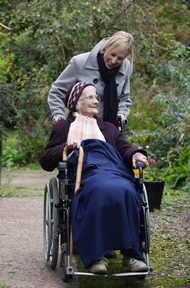The Alzheimer’s Society wants more people to talk about dementia
The Alzheimer’s Society is encouraging more people to talk about dementia after a poll revealed that almost half of UK adults would find it hard to tell their family if they thought they had the condition.

The charity published the survey, carried out by YouGov, today to mark Dementia Awareness Week, which began on Sunday and runs until Saturday.
The poll revealed that 45 per cent of people would find it difficult to tell their family if they thought they had the condition, with people over the age of 55 being more likely to find it hard.
The survey also shows that 56 per cent of people would find it hard to broach the subject of dementia with someone they knew if they were worried they were developing the condition.
The Alzheimer’s Society wants to break the stigma surrounding dementia and has today published a booklet called ‘It’s time to talk about dementia’ which provides tips on how to start a conversation about the condition.
Jeremy Hughes, chief executive of the charity, said: “It is really saddening that dementia is still a disease that many of us don’t feel comfortable talking about, especially with our own families.
“One in three people over 65 will develop dementia in the UK and hundreds of thousands more are affected by the condition in the same way, whether it is a family member or a friend.
“This Dementia Awareness Week we want people to start talking about dementia. It is not just about preparing us all for a condition that is on the rise and currently incurable. It is about banishing the stigma surrounding dementia that is causing so many people to struggle in silence.”
Mike Howarty, who has dementia, is the backing the Alzheimer’s Society’s campaign and believes it is “vital” that more people talk about the condition.
The 83-year-old said: “I was diagnosed with dementia six years ago. My father and grandmother had the condition so as soon as I noticed I was repeating myself and starting to forget things I went straight to my GP.
“I tell everyone I have dementia. It is absolutely vital that we talk about the condition. Unless people are prepared to talk about it, many of those who are worried about their memories will never pluck up the courage to see their GP.
“I still do all the things I love such as playing golf, working in the garden, swimming and playing bridge. I also do some part-time work helping others who have been diagnosed with dementia.
“I want to stress the importance of talking about the condition. It really will make a huge difference.”
Latest News
 29-Jul-24
Dementia Bus gives carehome.co.uk staff insight into life with dementia
29-Jul-24
Dementia Bus gives carehome.co.uk staff insight into life with dementia
 27-Jul-23
UK's top home care agencies in 2023 revealed
27-Jul-23
UK's top home care agencies in 2023 revealed
 30-Nov-22
A quarter of older people keep their falls secret from family
30-Nov-22
A quarter of older people keep their falls secret from family
 29-Nov-22
'Covid-19 has not gone away' say terminally ill
29-Nov-22
'Covid-19 has not gone away' say terminally ill
 28-Nov-22
IT consultant who received poor care opens 'compassionate' home care business
28-Nov-22
IT consultant who received poor care opens 'compassionate' home care business